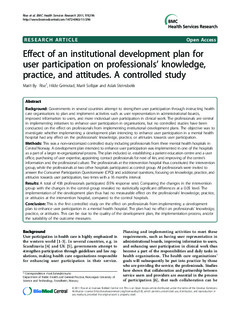| dc.description.abstract | Background: Governments in several countries attempt to strengthen user participation through instructing health
care organisations to plan and implement activities such as user representation in administrational boards,
improved information to users, and more individual user participation in clinical work. The professionals are central
in implementing initiatives to enhance user participation in organisations, but no controlled studies have been
conducted on the effect on professionals from implementing institutional development plans. The objective was to
investigate whether implementing a development plan intending to enhance user participation in a mental health
hospital had any effect on the professionals’ knowledge, practice, or attitudes towards user participation.
Methods: This was a non-randomized controlled study including professionals from three mental health hospitals in
Central Norway. A development plan intended to enhance user participation was implemented in one of the hospitals
as a part of a larger re-organizational process. The plan included i.e. establishing a patient education centre and a user
office, purchasing of user expertise, appointing contact professionals for next of kin, and improving of the centre’s
information and the professional culture. The professionals at the intervention hospital thus constituted the intervention
group, while the professionals at two other hospitals participated as control group. All professionals were invited to
answer the Consumer Participation Questionnaire (CPQ) and additional questions, focusing on knowledge, practice, and
attitudes towards user participation, two times with a 16 months interval.
Results: A total of 438 professionals participated (55% response rate). Comparing the changes in the intervention
group with the changes in the control group revealed no statistically significant differences at a 0.05 level. The
implementation of the development plan thus had no measurable effect on the professionals’ knowledge, practice,
or attitudes at the intervention hospital, compared to the control hospitals.
Conclusion: This is the first controlled study on the effect on professionals from implementing a development
plan to enhance user participation in a mental health hospital. The plan had no effect on professionals’ knowledge,
practice, or attitudes. This can be due to the quality of the development plan, the implementation process, and/or
the suitability of the outcome measures. | nb_NO |
